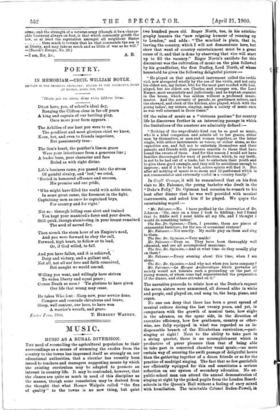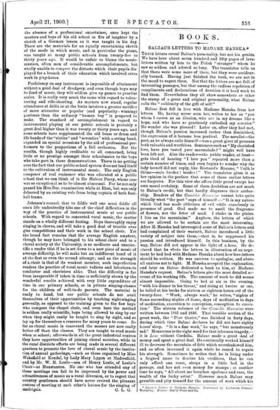MUSIC.
MUSIC AS A RURAL DIVERSION.
THE need of reconciling the agricultural population to their surroundings as a means of stemming the exodus from the country to the towns has impressed itself so strongly on our educational authorities, that a circular has recently been issued to teachers and managers suggesting means by which the existing curriculum may be adapted to promote an interest in country life. It may be contended, however, that the classes are quite as much in need of this discipline as the masses, though some consolation may be derived from the thought that what Horace Walpole called "the flax of quality" to the towns is no new thing, but quiet two hundred years old. Roger North, too, in his autobio- graphy laments the "now reigning humour of running up to London," and adds : "The mischief is plain, that is, leaving the country, which I will not demonstrate here, but show that want of country entertainment must be a great cause of it, and that is done by observing that vice will start up to fill the vacancy." Roger North's antidote for this discontent was the cultivation of music on the plan followed by his grandfather, the first Dudley, Lord North, of whose household he gives the following delightful picture:—
" He played on that antiquated instrument called the treble viol, now abrogated wholly by the use of the violin, and not only his eldest son, my father, who for the most part resided with him, played, but his eldest son Charles, and younger son, the Lord Keeper, most exquisitely and judiciously ; and he kept an organist in the house, which was seldom without a professed music- master. And the servants of parade, as gentlemen ushers, and the steward, and clerk of the kitchen, also played, which with the young ladies', my sisters, singing, made a society of music such as was well esteemed in those times."
Of the value of music as a "virtuous pastime" for country life he discourses farther in an interesting passage in which the limitations of the amateur are admirably defined :—
" Nothing of the unprofitable kind can be so good as music, who is a kind companion and admits all to her graces, either men by themselves, or men and women together, or the latter single, with either instruments or voices, or either alone, as the capacities are, and fail not to entertain themselves and their parents and friends with pleasures sensible to those that have found the sweets of them. And for this reason I would not have families discouraged for watt of perfection, which, to say truth, is not to be had out of a trade, but to entertain their youth and to give them good example, and they will be ambitious enough to improve ; and if it be to be had, active spirits will find it. But after all nothing of music is so mean and ill-performed which is not commendable and extremely tseful ia a country family."
In Cryll Grange, it will be remembered that on his first visit to Mr. Falconer, the young bachelor who dwelt in the "Duke's Folly," Dr. Opimian had occasion to remark to his host after dinner that he was well provided with musical instruments, and asked him if he played. We quote the entertaining sequel :— "Mr. Falconer.—No. I have profited by the observation of Dr. Johnson: Sir, once on a time I took to fiddling; but I found that to fiddle well I must fiddle all my life, and I thought I would do something better.'
The Rev. Dr. Opimian.—Then, I presume, these are pieces of ornamental furniture, for the use of occasional visitors ?
Mr. Falconer.—Not exactly. My maids play on them and sing to them.
The Rev. Dr. Opimian.—Your maids!
Mr. Falconer.—Even so. They have been thoroughly well educated, and are all accomplished musicians.
The Rev. Dr. Opimian.—And at what time do they usually play on them ?
Mr. Falconer.—Every evening about this time, when I am alone.
The Rev. Dr. Opimian.—And why not when you have company ? Mr. Falconer.—La Morgue Aristoeratigue which pervades all society would not tolerate such a proceeding on the part of young women, of whom some had superintended the preparation of the dinner, and others attended on it."
The narrative proceeds to relate how at the Doctor's request the seven sisters were summoned, all dressed alike in white and purple, and played on, and sang to, the harp, piano, and organ.
No one can deny that there has been a great spread of musical culture during the last twenty years, and yet, in comparison with the growth of musical taste, how slight is the advance, on the spear aide, in the direction of executive efficiency, how few gentlemen, country or other- wise, are fully equipped in what was regarded as an in- dispensable branch of the Elizabethan curriculum,—part- singing at sight ! Next to the ability to take part in a string quartet, there is no accomplishment which is productive of purer pleasure than that of being able to take part in concerted chamber vocal music,—no more certain way of securing the swift passage of 'delightful hours than the gathering together of a dozen friends or so for the practice of madrigal singing. The fact that so few gentlefolk are elliciently equipped for this end constitutes a serious reflection on our system of secondary education. No ex- public-school man can attend the annual demonstration of singing at sight by the picked pupils from the London Board- schools in the Queen's Hall without a feeling of envy mixed with humiliation. The inimitable Colonel Baden-Povtell, in
the absence of a professional entertainer, once kept the masters and boys of his old school in fits of langhter by a sketch of a German lesson as it was taught in his day. There are the materials for an equally entertaining sketch of the mode in which music, and in particular the piano, was taught at many public schools from twenty-five to thirty years ago. It would be unfair to blame the music- masters, often men of considerable accomplishments, but wholly unable to conquer the distaste which their pupils dis- played for a branch of their education which involved extra work in play-hours.
Proficiency on any instrument is impossible of attainment without a good deal of drudgery, and even though boys may be fond of music, they will seldom give np games to practise scales. It is really very much the same with regard to volun- teering and rifle-shooting. As matters now stand, regular attendance at drills or at the butts involves a greater sacrifice of more attractive or popular (and popularity, winning) pastimes than the ordinary "human boy" is prepared to make. The standard of accomplishment in regard to instrumental playing at our public schools is probably a great deal higher than it was twenty or thirty years ago, and some schools have supplemented the old brass or drum and fife bands of the "sixties" and "seventies" with a string band, expanded on special occasions by the aid of professional per- formers to the proportions of a full orchestra. But the results, though highly creditable to all concerned, bring little or no prestige amongst their schoolmates to the boys who take part in these demonstrations. There is no getting over the fact that our pnblic-school system does not lend itself to the cultivation of instrumental music. The only English composer of real eminence who was educated at a public school that we can think of is Sir Hubert Parry, whose case was so exceptional as to be almost abnormal. For he not only passed his Mus.Bac. examination while at Eton, but was only debarred by an existing rule from being captain of both foot- ball teams.
Johnson's remark that to fiddle well one must fiddle all one's life undoubtedly hits one of the chief difficulties in the way of the practice of instrumental music at our public schools. With regard to concerted vocal music, the matter stands on a wholly different footing. Boys thoroughly enjoy singing in chorus, and will take a good deal of trouble over glee competitions and their work in the school choir. Yet the broad fact remains that the average English amateur, though he may have belonged to his school choir and to a choral society at the University, is so mediocre and unscien- tific a reader that if be is set down to a new piece of music of average difficulty, he will make but an indifferent hand of it at the first or even the second attempt; and as the strength of a choir is that of its weakest member, such imperfection renders the practice of vocal music tedious and laborious .to conductor and choristers alike. That the difficulty is far from insuperable if taken in time is sufficiently shown by the wonderful results achieved with very little expenditure of time in our primary schools, or in private singing-classes for the children of well-to-do parents. The material is ready to hand, bat our public schools do not avail themselves of their opportunities by teaching sight-singing generally, as opposed to the training given to the few boys who compose the chapel choir, and even here the method it seldom really scientific, boys being allowed to sing by ear when they might easily be taught to sing by eight, and so lay up for themselves a resource for many years to come. So far as choral music is concerned the masses are now really better off than the classes. They are taught to read music when at school; afterwards in all the great industrial centres they have opportunities of joining choral societies, while in the rural districts efforts are being made in several different quarters to promote the love of choral music by the institu- tion of annual gatherings,—such as those organised by Miss Wakefield at Kendal, by Lady Mary Lygon at Madresfield, and by Mr. W. H. Leslie—son of Henry Leslie, of Leslie's Choir—at Hunetanton. No one who has attended any of these meetings can fail to be impressed by the power and attractiveness of music as a rural diversion, or to regret that country gentlemen should have never revived the pleasant custom of meeting at each other's houses for the singing of



































 Previous page
Previous page